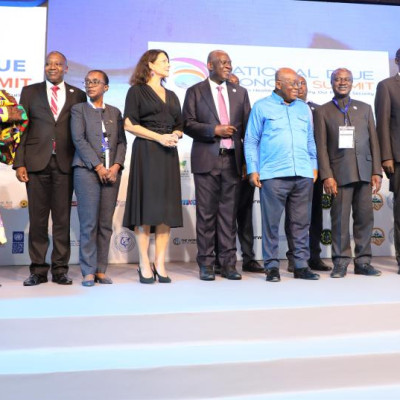6 June 2023
GHANA’S Minister for Fishing and Aquaculture Development, Mavis Hawa Koomson, said the country would enforce existing ocean-protection laws to enhance the prospects of the blue economy.
Koomson said ‘the time has come to enforce these laws because sea pollution has negatively affected the economy and is taking livelihoods from people.
The minister said this during the two-day National Blue Economy Summit, which ended on Thursday with local and international participation.
She pointed out that the devastating impact of sea pollution, especially from plastic waste on Ghana’s marine fishing industry had made the sector less profitable due to dwindling harvests.
‘When the artisanal fishermen go fishing, all they bring out is plastic waste and other kinds of waste. Even the large trawlers which do deep fishing also bring out so much waste instead of fish,’ said the minister.
She said this situation had financial consequences for fishermen because after spending money on fuel and fishing gear, ‘and if all they harvest is plastic waste, how can they recoup their investments?’
‘Plastic pollution in the sea is deepening poverty among artisanal fishermen. When you buy fuel and nets to go fishing and collect only waste, you cannot put food on the table for your family. This development has serious implications for our economy and the world at large,’ said Koomson.
Meanwhile, the minister said research had shown that fish consumers also risked health challenges through secondary plastic ingestion through fish consumption as some fish eat the plastic and other waste dumped in the ocean.
‘The fish sometimes even eats the waste in the water, and it kills them, and when they die, they pollute the sea even more, creating hazards for other marine creatures,’ she lamented.
Koomson added, ‘Our health is important, but if the sea is polluted, it affects the fish in the sea and the fish consumer.’
The minister said Ghana would adopt a two-pronged approach to deal with the situation through public education and enforcement of existing laws to ensure that citizens adopt positive attitudes towards the management of the sea.
The minister emphazised, ‘We need to educate the public to let them know the negative consequences of dumping plastics into the sea so that their attitudes can change. We must also enforce the laws to deter people from engaging in practices that would eventually pollute the sea.’
On a positive note, Koomson said the country’s closed fishing season program initiated in 2015 had been yielding positive dividends by helping to generate bumper harvest and restocking most fish species that were becoming rare.
Data shows that Ghana has a high rate of fish intake, with fish providing 60 percent of animal protein and 25 kg per capita consumption. The fishing industry employs about 2.7 million people, making up about 20 percent of the active labor force, according to 2018 statistics.
A marine expert, Albert Fiatui said Ghana needs to take bold steps to reverse the rate of sea pollution, especially the dumping of plastic waste into the sea, as the sea is critical to the country’s economy.
‘The sea is one of the most important resources for Ghana because we are an import-dependent economy, relying heavily on marine transportation. So there is no way we can do without the ocean as shipping us done across the oceans,’ Fiatui, Executive Director of Centre for International Maritime Affairs Ghana (CIMAG), said.
He said sea was suffering from over-usage, through over-fishing and pollution, which overburden the ocean, making it not able to absorb the volume of carbon dioxide it receives, leading to ocean acidification.
If the ocean is not able to absorb the carbon dioxide received from us and give us the oxygen we need, Fiatui warned, ‘Then we do not have life.’
‘At this time, 40 percent of Ghana’s ocean is polluted. Every square kilometer contains about 13,000 pieces of plastic materials. This was discovered by the underwater autonomous vehicles, robots and underwater censors used by the International Ocean Institute,’ Fiatui disclosed.
He said the time was up for the Ghanaian government and its stakeholders to take action to end sea pollution, if the country really wants to derive full benefits from the blue economy. He said the discussions and commitments made at the national blue economy summit should be the starting point for enforcement..
‘We have many policies and laws in place, but nobody enforces them. So it is time to pick up these policies and regulations and enforce them. Government should be able to grasp the will and the commitment to make sure that whatever we say and discuss here is implemented rigorously,’ the CIMAG chief stated.
